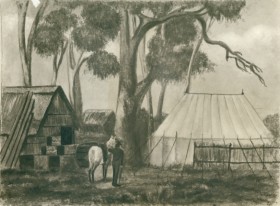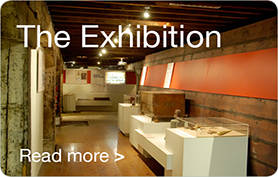
NOVEMBER 16.-As we had now obtained the poles belonging to the large tent from the ship, our men proceeded to put it up, and the children and I were busy all day in arranging our luggage and bedding. It was a marquee large enough to divide into two apartments, and gladly we took possession of our new habitation. It was situated near some large gumtrees about half a mile from the shore, and most of the settlers, both from the Cygnet and the Africaine, were within view. The country, as far as we could see, was certainly beautiful, and resembled an English park, with long grass in abundance and fine trees scattered about, but not so many as to make it unpleasant, and no brushwood. We were about a hundred yards from the nearest lagoon, where at that time there was plenty of water and very clear. Nor was it bad-tasted, though not from a running stream. Far from being so good for washing as to get clothes clean without soap, as some accounts represented, it was harder than even the water in London.
The birds here were of beautiful plumage. White and black cockatoos were in abundance, the former with a large yellow or orange coloured crest, sometimes pink. Parrots, or rather parrakeets, as they would be called in England, for they were very small, were of every variety of colour. Also there were wild ducks and flocks of geese, with occasionally a black swan flying. Here was also the mocking-bird, and it was quite amusing to hear him imitate our cock crowing in the morning and the call of the guinea-fowls at a neighbouring tent, which he did with great exactness, but in a more musical tone, for it sounded something like a barrel organ. But when he tried to imitate the laughing jackass it was so exceedingly droll that we could not forbear laughing heartily.



What a treasure for such an account to have lasted the years, and s privilege to read all these years later. Thanks for sharing 🙂